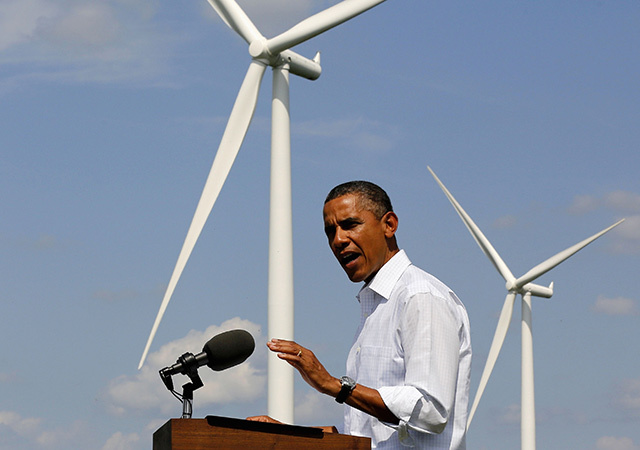
President Barack Obama pledged America’s “ironclad commitment” to anxious Persian Gulf nations to help protect their security.
He pointedly mentioned the potential use of military force and offered assurances that a potential nuclear agreement with Iran would not leave them more vulnerable.
At the close of a rare summit at the presidential retreat at Camp David, Mr Obama said the US would join the Gulf Co-operation Council nations “to deter and confront an external threat to any GCC state’s territorial integrity”.
The US pledged to bolster its security co-operation with the Gulf on counter-terrorism, maritime security, cybersecurity and ballistic missile defence.
“Let me underscore, the United States keeps our commitments,” Mr Obama said at a news conference.
The meeting at Mr Obama’s retreat in the Maryland mountains was aimed at quelling the Gulf’s fears of US-led nuclear talks with Iran.
Gulf states worry that if Iran wins international sanctions relief, the influx of cash would embolden what they see as Tehran’s aggression in the region.
The president acknowledged those concerns, but said the US believes Iran’s focus would be on shoring up an economy that has struggled under the sanctions pressure.
Mr Obama and senior advisers walked the Gulf nations through the work-in-progress nuclear deal in detail during private meetings yesterday.
The president said while the Gulf leaders had not been asked to “sign on the bottom line” to approve the framework, they did agree “that a comprehensive, verifiable solution that fully
addresses the regional and international concerns about Iran’s nuclear programme is in the security interests of the international community, including our GCC partners”.
Saudi foreign minister Adel al-Jubeir said Arab leaders were “assured that the objective is to deny Iran the ability to obtain a nuclear weapon” and that all pathways to such a weapon would be cut off.
He added that it was too early to know if a final nuclear agreement would be acceptable, saying: “We don’t know if the Iranians will accept the terms they need to accept.”
The US and five other nations are working to finalise the nuclear deal ahead of an end of June deadline.
As if to underscore Gulf concerns, an Iranian naval patrol boat fired on a Singapore-flagged commercial ship in the Persian Gulf yesterday.
A US official said it was an apparent attempt to disable the ship over a financial dispute involving damage to an Iranian oil platform.
The incident took place near the island of Abu Musa just inside the Gulf, according to the official. The White House said no Americans were involved in the incident.
Ben Rhodes, Mr Obama’s deputy national security adviser, said while the incident did not come up in yesterday’s discussions, it was “exactly the type of challenge” the Gulf nations are focused on.
Mr Obama has said he shares the Gulf’s concerns about Iran’s activities in the region. The US has criticised Iran’s support for Hezbollah, as well as attacks carried out by Iran’s Quds Force.
In 2011, the Obama administration accused Iran of plotting to kill the Saudi ambassador to the United States in Washington.
The summit marked an unusual investment by Mr Obama in his relationship with the Gulf.
He rarely uses Camp David for personal or official business, but White House aides hoped the more intimate setting would lead to a more candid conversation with the Arab allies.
Just two other heads of state – the emirs of Qatar and Kuwait – joined him at Camp David. Saudi Arabia, United Arab Emirates, Oman and Bahrain all sent lower-level but still influential representatives.
Among the other issues discussed at the summit were the US-led campaign against the Islamic State, the fighting in Syria, and the intractable conflict between Israelis and Palestinians.
Recommended for you
